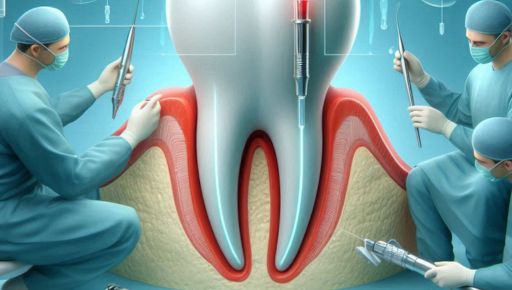
If you’re experiencing persistent tooth pain or discomfort, surgical root canal treatment may be the solution to saving your natural tooth. Our experienced dentist in Chase, BC, specializes in providing personalized endodontic care, including surgical root canal treatment, to alleviate pain and restore oral health. Also known as apicoectomy, surgical root canal treatment is a specialized procedure that involves removing the infected tip of the tooth root to prevent further infection and promote healing.
Our state-of-the-art dental facility and expert team ensure that you receive the highest quality care, from diagnosis to recovery, helping you achieve a pain-free smile.
Understanding Surgical Root Canal Treatment
Surgical root canal treatment, also known as apicoectomy, is a specialized dental procedure designed to treat infected or damaged teeth that cannot be resolved with traditional non-surgical root canal therapy. Performed by a trained dentist or endodontist, this surgical procedure involves removing the infected tip of the tooth root, sealing the remaining root canal, and repairing surrounding tissues to prevent further infection.
By targeting the source of the infection, surgical root canal treatment aims to alleviate persistent tooth pain, swelling, and discomfort, while preserving the natural tooth and restoring oral function.
Types of Surgical Root Canal Treatment
- Apicoectomy: Removal of the infected root tip.
- Apical Curettage: Removal of the infected tissue and cyst or abscess.
- Hemisection: Removal of half of the tooth.
Indications for Surgical Root Canal Treatment
Here are the indications for surgical root canal treatment:
Primary Indications
- Failed Non-Surgical Root Canal Treatment: Persistent infection or symptoms after non-surgical root canal treatment.
- Complex Root Anatomy: Teeth with complex root structures, making non-surgical treatment challenging.
- Persistent Infection: Chronic infection or abscess formation despite non-surgical treatment.
- Fractured or Cracked Teeth: Teeth with vertical fractures or cracks that compromise the root.
- Cysts or Abscesses: Large cysts or abscesses surrounding the tooth root.
Secondary Indications
- Recurrent Infection: Repeated episodes of infection or symptoms after non-surgical treatment.
- Root Canal Obstruction: Blockage of the root canal, preventing non-surgical treatment.
- Perforation: Accidental perforation of the root canal during non-surgical treatment.
- Root Resorption: Internal or external root resorption requiring surgical intervention.
- Dental Trauma: Traumatic injuries causing root damage or infection.
Surgical Root Canal Procedure
The surgical root canal treatment procedure typically involves the following:
Pre-Operative Steps
- Diagnosis: Confirm the need for surgical root canal treatment.
- Anesthesia: Administer local anesthesia to numb the area.
- Preparation: Clean and disinfect the area.
Surgical Procedure
- Incision: Make a small incision in the gum to access the infected area.
- Tissue Reflection: Reflect the gum tissue to expose the root.
- Infected Tissue Removal: Remove infected tissue and cysts or abscesses.
- Root-End Resection: Remove the infected tip of the root.
- Biopsy: Take a sample of the removed tissue for examination.
- Root-End Filling: Seal the remaining root canal.
Closure and Recovery
- Closure: Close the incision with sutures.
- Recovery: Monitor for bleeding and swelling.
- Pain Management: Prescribe pain medication.
Post-Operative Care
- Rest: Rest for 24 hours.
- Ice Packs: Apply ice packs to reduce swelling.
- Soft Food Diet: Follow a soft food diet.
- Antibiotics: Take prescribed antibiotics.
- Follow-Up: Schedule follow-up appointments.
Benefits of Surgical Root Canal Treatment
Surgical root canal treatment offers the following benefits:
- Relief from Pain: Eliminates persistent tooth pain and discomfort.
- Tooth Preservation: Saves the natural tooth, avoiding extraction.
- Infection Control: Removes infected tissue and prevents spread.
- Prevents Abscess Formation: Eliminates cysts and abscesses.
- Improved Oral Health: Restores oral function and overall health.
- High Success Rate: Proven effectiveness in resolving infection.
- Long-Term Solution: Provides lasting results, reducing the need for future procedures.
- Reduced Risk of Complications: Minimizes risk of infection spreading to surrounding tissues.
If you’re experiencing tooth pain or have been recommended for surgical root canal treatment, consult with your dentist or endodontist to discuss the best course of treatment.






